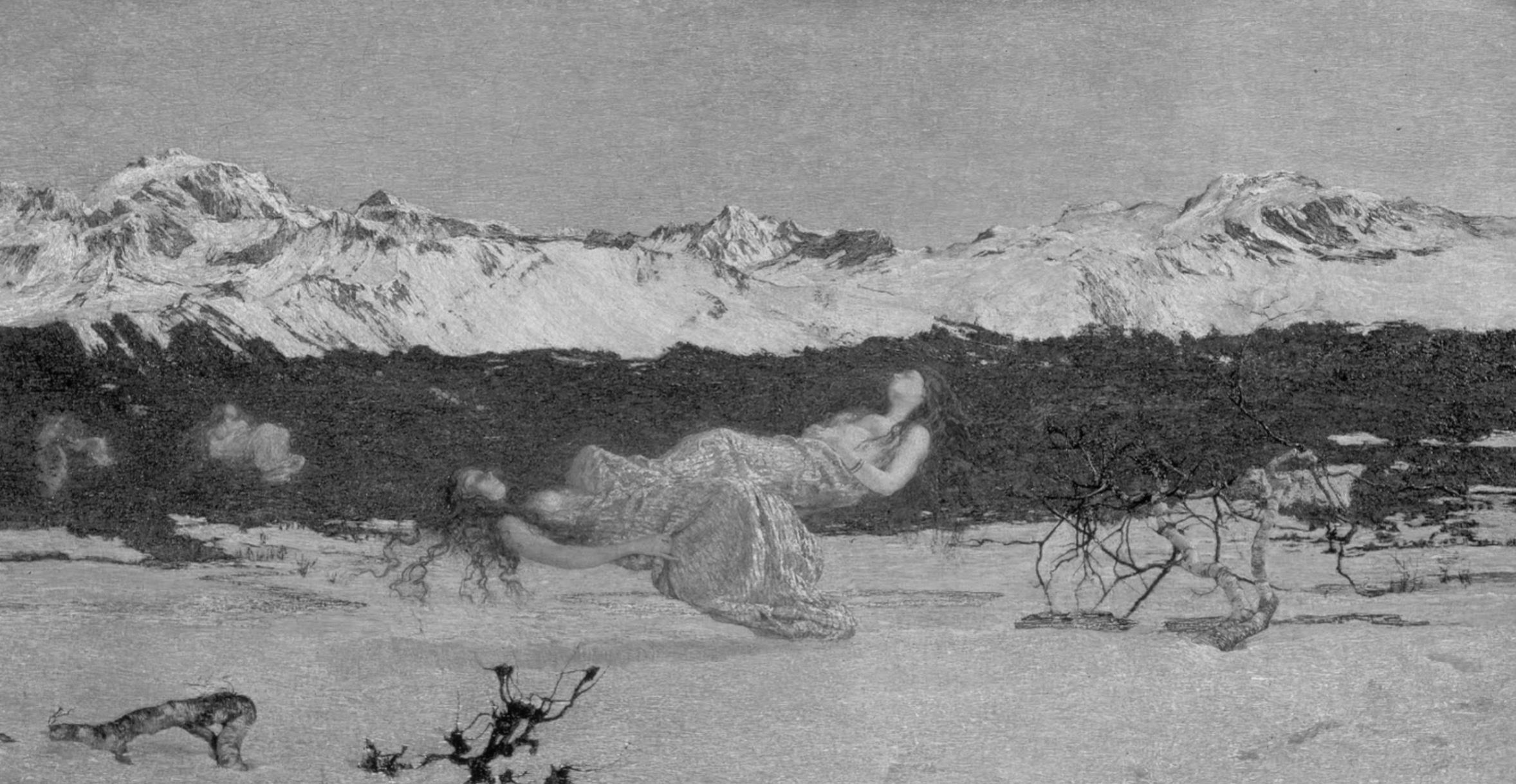Sestina on Segantini’s “The Punishment of Lust”
Note: Due to the length of the lines, this poem is best viewed on desktop.
Alpswise in its white ruin, when the workers had the lead carbonate
perfected at Rhodes, shavings of lead over a bowl filled with vinegar
I took the History of Make-Up pilfered I’m told from the State
of Vermont archives inside of my blue fox great coat
like Cagliostro perfuming the air about him, who’d seen I’m told
the ark and the crucifixion, who’d therefore seen hence or whence time reduced
beyond his May-made London corroborant in its borage and white wine reduced
both ingested to live forever, and as if to make these living hours carbonate
I’d taken a poker stand of last resort in saying the tell’s already told
suspending en plein air several custodians of ginger hair, euphemized as a “medium vinegar”
colour in Ireland where it’s a common pick-me-up in the same ilk as get your coat
you’ve pulled, the country both sensitive in terms of hair colours and matters of state
where you could float between one and another red-flamed castigated woman in a state
of matter misheard by Simply Red as mater for whom being ginger was to be reduced
to simply red. The poets say instead carmine coral ruby as their mordant to help coat
a painting on lust beyond the more pedestrian their hair is red carbonate
rock with cobalt-bearing dolomite, my lover likewise complaining of my recent vinegar
jaunts (midnight, Walmart, heavy-breathing, huffing, banned). The lawyer told
me that research for a poem on some painting wouldn’t hold up in court and I told
him hey man that some painting is my The Punishment of Lust, and in this state
lust is the same as blackening one’s teeth with oak galls and vinegar.
Once fashionable too, my lover petitions my own country’s government to have my influence reduced
equivalent to a silent-soft ginger-such-dreaming hush blown through a field of white carbonate
where drowsily the censors suggested to at least adorn each figure with a drooping coat
and the late evening of the heart tops the mountains to take on that sunlight coat
and the figures repeat again as if to prove a tale’s as only old as the time from when it’s last told
and some sage advice: that under the aegis of the broken a man should cry to fill fractures with carbonate
my crown instead alp-flowers, herbariums, small seaways of violet from which I scorn to change my state
with that of kings, although in retrospect I’d too rather it wasn’t further reduced.
I promise I’ve cleaned the blood from the mountain sleds with vinegar.
I’m sorry, I mean that the mountain air remains unseasoned without vinegar.
I too plan on escaping out in a cloak with its sleight-of-hand a resemblance to a foreshortened coat
though as a plan I’ve been caught out before on my own self-promise and reduced
to the also-ran painters and also-ran poets scorning the tailors that told
them that to clothe the red and floating lost was beyond their ken. The local state
government has reopened the mountain museum with duelling exhibits on carbon dating and carbonate
where I learnt that the oldest vinegar dated to this or that, and also have been told
to tell you that still with no coat and frozen those mountain reds lie still in state
reduced forever, the censors blotting their eyes for fear they’re dotted lead carbonate.
Jodi Johnson is a N. Irish poet. His work has been published inThe Nation, Prelude, and other magazines in the U.S. and abroad. He was educated at Oxford, the Iowa Writers' Workshop, and UL–Lafayette. Currently co-editor for poetry at Tampa Review, he teaches writing at Harvard, and is currently finishing his first collection.

